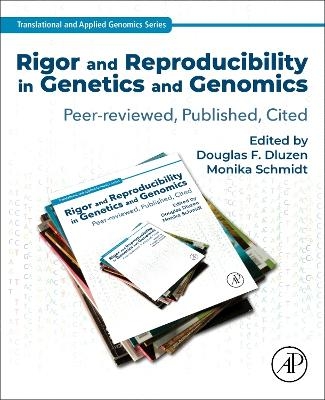
Rigor and Reproducibility in Genetics and Genomics
Academic Press Inc (Verlag)
978-0-12-817218-6 (ISBN)
Here, active geneticists, clinicians, and bioinformaticists offer practical solutions for a variety of challenges associated with several modern approaches in genetics and genomics, including genotyping, gene expression analysis, epigenetic analysis, GWAS, EWAS, genomic sequencing, and gene editing. Emphasis is placed on rigor and reproducibility throughout, with each section containing laboratory case-studies and classroom activities covering step-by-step protocols, best practices, and common pitfalls. Specific genetic and genomic technologies discussed include microarray analysis, DNA-seq, RNA-seq, Chip-Seq, methyl-seq, CRISPR gene editing, and CRISPR-based genetic analysis. Training exercises, supporting data, and in-depth discussions of rigor, reproducibility, and ethics in research together deliver a solid foundation in research standards for the next generation of genetic and genomic scientists.
George P. Patrinos is a Professor of Pharmacogenomics and Pharmaceutical Biotechnology in the University of Patras (Greece), Department of Pharmacy, and Head of Division of Pharmacology and Biosciences of the same department and holds adjunct Full Professorships at Erasmus MC, Faculty of Medicine, and Health Sciences, Rotterdam (the Netherlands), and the United Arab Emirates University, College of Medicine, Department of Genetics and Genomics, Al-Ain (UAE). Also, from 2018 until the end of 2024, he was Chair of the Global Genomic Medicine Collaborative (G2MC). He served 12.5 years as a full member and Greece’s National representative in the CHMP Pharmacogenomics Working Party of the European Medicines Agency (EMA). George has more than 340 publications in peer-reviewed scientific journals, some of them in leading scientific journals, such as The Lancet, Nature Genetics, Nature Reviews Genetic, Nucleic Acids Research, Genes & Development. He has also coauthored and coedited more than 15 textbooks, among which the renowned textbook Molecular Diagnostics, published by Academic Press, now in its 3rd edition, while he is the editor of Translational and Applied Genomics book series, published by Elsevier. Furthermore, he serves as the Editor-In-Chief of the prestigious Pharmacogenomics Journal (TPJ), published by Nature Publishing Group, Associate Editor, and member of the editorial board of several scientific journals, and advisory and evaluation committees. Apart from that, George is the main coorganizer of the Golden Helix Conferences, an international meeting series on Pharmacogenomics and Genomic Medicine with more than 50 conferences organized in more than 25 countries worldwide. Douglas F. Dluzen is a geneticist and has previously studied the genetic contributors to aging, drug metabolism, hypertension, and inflammation. Dluzen is particularly interested in how social determinants of health influence gene expression in the immune system. Currently, he is the director of the Professional Development and Career Office at the Johns Hopkins University School of Medicine and has worked previously at the National Institutes of Health and Morgan State University. He enjoys writing science fiction and hiking with his family. Monika Schmidt completed her doctoral work in the realm of tandem repeat-associated neuromuscular/neurodegenerative diseases, with a focus upon fragile X syndrome, amyotrophic lateral sclerosis, and DNA metabolism. Monika has a particular interest in wet lab validation of in silico findings, with a penchant for Southern blotting of structurally complex repetitive DNA sequences. Currently, she is a freelance scientific editor, private healthcare liaison, and event organizer. Monika enjoys traveling on a shoestring, working with her hands on home or cottage improvements, and spending time with her spouse and children.
SECTION 1 Introduction 1. Rigor and reproducibility in genetic research and the effects on scientific reporting and public discourse 2. Unveiling the hidden curriculum: Developing rigor and reproducibility values through teaching and mentorship SECTION 2 Genotyping 3. Genome-wide association studies (GWAS): hat are they, when to use them? 4. GWAS in the learning environment 5. Polygenic risk scores and comparative genomics: Best practices and statistical considerations 6. DNA sequencing and genotyping in the classroom 7. Classroom to career: Implementation considerations for engaging students with meaningful DNA sequencing learning opportunities SECTION 3 Next-generation sequencing & gene expression 8. Review of gene expression using microarray and RNA-seq 9. Guidelines and important considerations for ‘omics-level studies 10. Best practices for statistical analysis of omics data 11. Validation of gene expression by quantitative PCR SECTION 4 Epigenetic analyses 12. Best practices for epigenome-wide DNA modification data collection and analysis 13. Best practices for the ATAC-seq assay and its data analysis 14. Best practice for ChIP-seq and its data analysis 15. A practical guide for essential analyses of Hi-C data 16. Epigenetics in the classroom SECTION 5 Gene editing technologies 17. Genome editing technologies 18. Genetic modification of mice using CRISPR-Cas9: Best practices and practical concepts explained 19. CRISPR classroom activities and case studies
| Erscheinungsdatum | 27.10.2023 |
|---|---|
| Reihe/Serie | Translational and Applied Genomics |
| Mitarbeit |
Herausgeber (Serie): George P. Patrinos |
| Zusatzinfo | 50 illustrations (20 in full color); Illustrations |
| Verlagsort | San Diego |
| Sprache | englisch |
| Maße | 191 x 235 mm |
| Gewicht | 1000 g |
| Themenwelt | Informatik ► Weitere Themen ► Bioinformatik |
| Naturwissenschaften ► Biologie ► Genetik / Molekularbiologie | |
| ISBN-10 | 0-12-817218-5 / 0128172185 |
| ISBN-13 | 978-0-12-817218-6 / 9780128172186 |
| Zustand | Neuware |
| Informationen gemäß Produktsicherheitsverordnung (GPSR) | |
| Haben Sie eine Frage zum Produkt? |
aus dem Bereich


